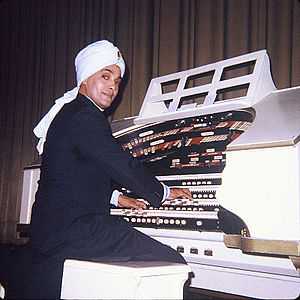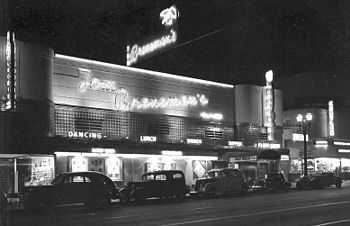Korla Pandit

Korla Pandit (September 16, 1921 – October 2, 1998), born John Roland Redd, was a musician, composer, pianist, organist and television pioneer. He was known as the Godfather of Exotica.
Early career
In 1921, Pandit was born in St. Louis, Missouri, to an African-American family. The next year, his family moved to Hannibal, Missouri where they lived for nine years. In 1931 the family moved to Columbia, Missouri.[1] Pandit's father was Ernest Redd, an African-American man, and his mother was Doshia O'Nina Redd, of French and African blood. Pandit had two brothers and four sisters, all light-skinned like himself. He attended a segregated school and learned to play piano. A contemporary of his, jazz pianist "Sir" Charles Thompson, knew him during that time; he said that John Roland Redd was the better piano player.[2]
During the mid-1940s, as Juan Rolando, he played the organ on the Los Angeles radio station KMPC, and he performed in various supper clubs and lounges.[3] He also was heard on Jubilee, the program of black jazz and swing bands transcribed by the Special Services of the War Department for airing to WWII servicemen overseas.
In 1944, he married Disney artist Beryl June DeBeeson, and the two reinvented his image, eventually replacing "Juan Rolando" with "Korla Pandit" and fabricating a romantic history for him as a baby born in New Delhi, India to a Brahmin priest and a French opera singer, who traveled from India via England, finally arriving in the United States.
Chandu the Magician
In 1948 he created eerie background music for the revival of radio's occult adventure series, Chandu the Magician, achieving atmospheric effects on the Novachord and the Hammond C-3 Electronic Organ.[4] In 1949, he was heard on Hollywood Holiday, broadcast from a Los Angeles restaurant.
Television

In 1948, while performing in Hollywood at a furrier's fashion show in Tom Breneman's Restaurant, Korla and Beryl met television pioneer Klaus Landsberg who offered Korla his own 15-minute daily television show with the stipulation that he would also provide musical accompaniment for Time for Beany, Bob Clampett's popular puppet show which featured Stan Freberg and Daws Butler as puppeteers and voices. Korla and Beryl's son, Shari Pandit, was born August 5, 1948.
Korla Pandit's Adventures In Music was first telecast on Los Angeles station KTLA in February 1949, and viewers soon became familiar with the musical opening, "The Magnetic Theme." Landsberg insisted that Korla not speak but instead simply gaze dreamily into the camera as he played the Hammond organ and Steinway grand piano, often simultaneously. Following Klaus's directorial and contractual stipulations, Pandit became an overnight star and one of early television's pioneering musical artists.[3]
In 1951, Pandit left KTLA in a deal with Louis D. Snader of Snader Telescriptions, resulting in short films which gave Pandit a national TV audience. However, problems with contract negotiations prompted Snader to replace Pandit with Liberace by 1953, which launched the pianist to fame. Pandit then did a show on KGO in San Francisco.
In the 1970s, when his television popularity waned, Pandit supplemented his income with increased personal appearances at supper clubs, supermarket openings, car agencies, music and department stores, pizza restaurants, lectures, music seminars, private lessons and the theater organ circuit. He made a cameo appearance in Tim Burton's biographical film, Ed Wood (1994), playing himself.[5]
Recordings
Pandit's audio works number over two dozen albums on 78 and 45rpm records, LP vinyl albums and CD labels. The back of his LP Hypnotique (Fantasy 8075) lists eight other Fantasy Records LPs by Pandit, and he eventually recorded 13 albums for Fantasy. His Christmas album, Merry Xmas (CD reissue 2007, Deja Vu), has been highlighted by Nick DiFonzo in The WORST Album Covers in the World... EVER! (New Holland Publishers, 2004).The album cover may be viewed at All Music.[6]
Pandit died in Petaluma, California of a myocardial infarction. Two years following his death, it was revealed in an article by Los Angeles magazine editor RJ Smith that Pandit was actually an African-American who had been born in the United States.[2]
Filmography
- Snader Telescriptions
- Chiu Chiu
- Song Of India
- Tango In D
- Moon Love
- Underwater Worshippers
- Miserlou
- The Swan
- Stormy Weather
References
- ↑ de Clue, David. "Epilogue". History, part two. KorlaPandit.com. Retrieved September 13, 2012.
- ↑ 2.0 2.1 Smith, R. J. (June 2001). "The Many Faces of Korla Pandit". Los Angeles (Emmis Communications) 46 (6): 72–77, 146–151. ISSN 1522-9149.
- ↑ 3.0 3.1 Korla Pandit biography: David Marshall-Rutledge deClue
- ↑ Dunning, John. On the Air: The Encyclopedia of Old-Time Radio. Oxford University Press, 1998. ISBN 0-19-507678-8
- ↑ IMDb: Korla Pandit
- ↑ Allmusic: Merry Xmas: Korla Pandit
Listen to
External links
- Korla Pandit official site managed by Verne Langdon
- Korla Pandit at Allmusic.com
|